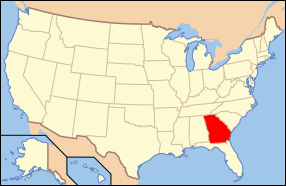Georgia in the American Civil War
| State of Georgia | |||||
|---|---|---|---|---|---|
| Nickname(s): "The Peach State" | |||||
|
|||||
| Capital | Milledgeville | ||||
| Largest City | Savannah | ||||
| Admission to confederacy | February 4, 1861 (5th) | ||||
| Population |
|
||||
| Forces supplied |
|
||||
| Major garrisons/armories | Fort Pulaski, Cockspur Island | ||||
| Governor | Joseph E. Brown | ||||
| Senators |
Benjamin Harvey Hill John Wood Lewis, Sr. Herschel Vespasian Johnson |
||||
| Representatives | List | ||||
| Restored to the Union | July 15, 1870 | ||||
Georgia was one of the original seven slave states that formed the Confederate States in February 1861, triggering the U.S. Civil War. The state governor, Democrat Joseph E. Brown, wanted locally raised troops to be used only for the defence of Georgia, in defiance of Confederate president Jefferson Davis, who wanted to deploy them on other battlefronts. When the Union blockade prevented Georgia from exporting its plentiful cotton in exchange for key imports, Brown ordered farmers to grow food instead, but the breakdown of transport systems led to desperate shortages.
There was not much fighting in Georgia until September 1863, when Confederates under Braxton Bragg defeated William S. Rosecrans at Chickamauga Creek. In May 1864, William T. Sherman started pursuing the Confederates towards Atlanta, which he captured in September, in advance of his March to the Sea. This six-week campaign destroyed much of the civilian infrastructure of Georgia, decisively shortening the war. When news of the march reached Robert E. Lee's army in Virginia, whole Georgian regiments deserted, feeling they were needed at home. The Battle of Columbus, fought on the Georgia-Alabama border on April 16, 1865, is reckoned by some criteria to have been the last battle of the war.
In December 1860, Georgian governor Joseph E. Brown, a passionate believer in slavery and southern states' rights, opined that the election of Abraham Lincoln, an anti-slavery Republican, to the U.S. presidency would result in the ending of slavery in the United States. He called upon Georgians to resist anti-slavery interventions, declaring that failure to do so would result in the emancipation of their slaves:
...
Wikipedia



